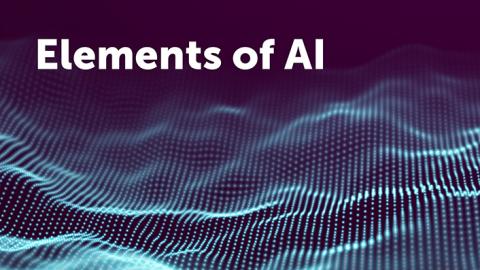
The French version of the "Elements of AI" platform is launched
On September 24, Sorbonne University launched the French version of the “Elements of AI” educational platform.
Developed by the University of Helsinki and the company Reaktor, this free online course hopes to train one percent of European citizens by 2021 in the fundamentals of artificial intelligence (AI). In France, this training is carried out by Philippe Esling, computer science professor at the Faculty of Sciences & Engineering and AI researcher at IRCAM (research institute and acoustic/music coordination).
What is the goal of this course?
Philippe Esling: Designed to be free and open to everyone, this course is intended for anyone interested in AI without any prerequisite in programming or mathematics.
The goal is to democratize AI by giving everyone, regardless of income or education, the necessary tools to understand the world of tomorrow through the prism of this new technology.
How did this initiative come about?
P.E.: Just like IT tools, AI will gradually become an essential skill in society. Today, we are seeing exponential technological acceleration, with computing power doubling every three to four months. In the era of digital transformation, it is important to give everyone the keys to understanding technological developments and their impact on our lives.
It is in this context that the Finnish Presidency of the Council of the European Union (EU) has decided to invest in the future skills of citizens by developing this educational platform. This course, which is being translated by the European Commission, will be rolled out in all EU countries by 2021.
AI elicits many fantasies. What will this training bring?
P.E.: There are a lot of illusions around AI. It is often mistakenly associated with the image of “The Terminator”. Many people believe it will replace humans in many ways. This ignorance of AI creates a disconnect between what it really is able to do and the desire to make it sound sensational.
"Any sufficiently advanced technology is indistinguishable from magic," wrote science fiction author Arthur C. Clarke. This means that when we don't know the mechanisms that govern a technology, we tend to think that it works like magic. To be able to demystify AI, you have to know its mechanisms. This is one of the goals of this training: to encourage people to understand how it works, to identify its real applications and implications, while recognizing its limitations.
Why was Sorbonne University chosen to bring this training to France?
P.E.: Sorbonne University is one of the largest French universities in terms of research and teaching. Thanks to its Faculties of Arts & Humanities, Medicine and Sciences & Engineering, it has, with its Alliance partners, considerable strengths both in the fundamental aspects of AI (in mathematics, computer science, robotics), and on its applications (in health, environment or even in artistic creation) or in digital humanities.
In total, more than a hundred experts from numerous laboratories are directly involved in AI research. These strengths are now united within SCAI, a center of excellence dedicated to research, teaching and innovation in AI.
Sorbonne University therefore has all the assets to support this ambitious “Elements of AI” training.
What are we going to learn in this training?
P.E.: Over a total duration of 30 to 60 hours, the course shows the implications of AI in real everyday situations using interactive exercises. Composed of six sections, it deals with notions such as neural networks, machine learning or societal issues.
The course includes both exercises managed automatically (MCQ type), but also more open questions and a space for discussion with the teachers.
What will be the role of the university in the deployment of the platform?
P.E.: We are working on adapting the platform for the French public. There will be four of us (three doctoral students and myself) to ensure the pedagogical follow-up of the course participants. We will provide answers to thoughts and understanding to people who would like more information or who have not understood certain elements of the course. Because no, AI is not yet advanced enough to answer questions about AI!
